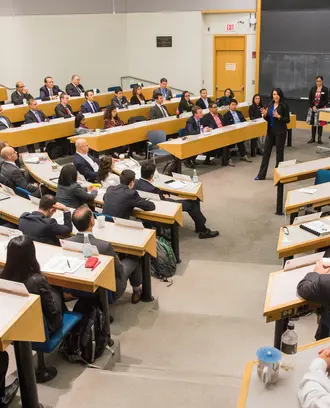Diane Rucker, EMBA '14
One of the keys to success in the MIT Executive MBA is a willingness to adapt. This means being open to trying something new and becoming comfortable with being uncomfortable. This mindset will help you gain the knowledge and tools you want – and it could transform your career.
I learned this early on as an MIT EMBA student. By being willing to take some risks and stretch my limits, I ended up pivoting into a completely new career. How does this happen? This mindset starts even before you apply, and continues to organically grow as you move through the program. Here are a few examples:
Be willing to fail
My first interview for the MIT EMBA was, frankly, a disaster, and I was not invited to join the Class of 2013. I had to face a basic question: is this the wrong program for me? And an even harder question: am I the wrong person for an MBA program?
The answers to these questions actually didn’t matter. The real question was “am I passionate enough about who I want to be to risk failure and to try again?” There is a happy ending to the story, as I joined the MIT EMBA class of 2014. But it was my failure that started my journey, and my willingness to face it that ultimately made me the right candidate.
Be open to learning
"I do not know everything; still many things I understand.” (von Goethe)
This program is not about the skills and knowledge you bring to MIT, but rather about the ability to be comfortable with what you don’t know. A hallmark of the MIT EMBA is that students do not come here to impress each other. In fact, most classmates, including me, spent orientation weekend wondering if the MIT EMBA Admissions Committee made a mistake (they didn’t). We come here because we genuinely want to learn and to change the world.
Change your definition of expert
You are not the expert – even if you believe that you are. I spent my early career managing a wafer fabrication facility. During my Operations Management class, we did a simulation, and I was paired with two classmates. One was a director of public art and the other was a financial advisor in asset management. Neither had a background in operations, but they asked questions that challenged what I thought I knew. Instead of following a traditional path for the simulation, their perspectives moved us in an unexpected direction that propelled us into the lead. I realized that I had a lot to learn, even in an area where I had been considered an expert.
Learn from classmates
Students come from all kinds of professional backgrounds and from around the world—and you can learn from each of them. One of the first students I met in the program worked in the global emergency response area and was based in Haiti. She dealt with famine, war, disease, and natural disasters – and the economic and personal impact on the people most affected. She and I were paired in a simulation in which she needed to talk to a colleague who had overstepped her bounds. She listened intently to and connected with her colleague; she took the time to show her concern and care for the employee, even when reminding her about the importance of safety and following critical steps. I learned that the relationships that you build are as important as what you need to do together.
Participate in the MIT ecosystem
When you come to MIT, there is an entire ecosystem to explore. Two classmates and I investigated the role of competitions in innovation. We found that the design of a competition was closely linked to the outcome. The MIT 100K competition and the Introduction to Product Design class both created a community in which crazy ideas garnered recognition and prizes. The real value, though, was that participants started to see themselves as innovators and changemakers. I also worked with the MIT Regional Entrepreneurship Accelerator Program (REAP), looking at how an ecosystem (government, risk capital, corporate partners, universities, and entrepreneurs) can support startups. Strong connections make it more likely that startups will succeed. Other factors, including space, repeat entrepreneurs, investment, and a willingness to take risks are equally important.
Transform your career
Throughout the program, I gained the knowledge, skills, network, and confidence to make a career change. I moved from engineering management to consulting on startup and ecosystem development, and then became executive director at University Enterprise Labs (UEL), an incubator in Minnesota. As ecosystems can be insular, with the same people involved, one of my challenges is to keep engaging new people with different ideas. Today, my team and I are working with 63 life science startups from idea to growth to scale. How will the MIT EMBA get you out of your comfort zone?
Diane Rucker, EMBA '14, is the Executive Director of University Enterprise Laboratories in St. Paul, MN and a Lecturer at the University of Minnesota.



